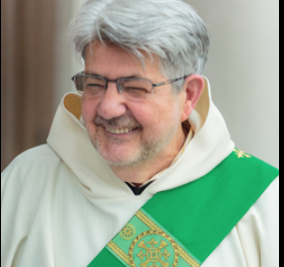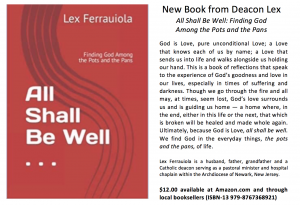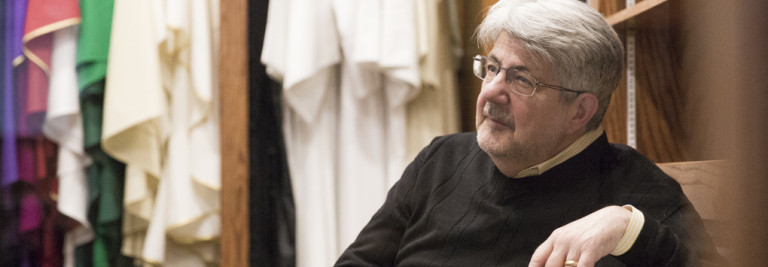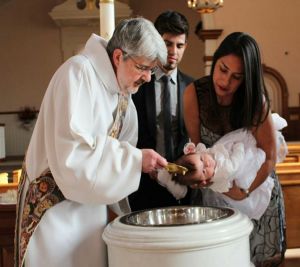Miracles and the Man in the Water
If a homeless man appeared in Washington Square Park and claimed to be Son of God, what would be the greater proof: if he turned five stale bagels into 2000 nourishing meals, or if he so inspired people to share whatever they had that, for one night throughout New York City, no one went to bed hungry, no one fell asleep without shelter, no one cried from loneliness or despair?
Jesus was filled with love and unconditional acceptance of others. While he walked the hills and shores of Galilee, he called those around him to acts of love and selflessness. He brought out the best in others just by being in his presence.
In the Gospel story about the loaves and the fishes, Jesus worked a wonderful miracle. But what was that miracle? Was it an act of magic that awed the crowd and defied the laws of physical nature? Or was it an act of collective love that defied the laws of human nature?

Deacon Lex Ferrauiola
Was the real miracle in this story not the reproduction of food, but Jesus’ ability to get people in the crowd to share what little food they had; and the discovery that once they opened their hearts and their lunch baskets, there was more than enough food for everyone? Knowing what we do about human nature, the second possibility would be the greater miracle.
We all come into the world with a basic human tendency to be self-centered and selfish; to put our interests, needs and survival before the love of God and the needs of others; to turn inward rather than reach outward in love with God and with our neighbor.
While our human nature enables us to survive it can also be an obstacle to love. While we focus on ourselves, it is difficult for God’s unconditional love to flow through us and out into a troubled world.
While we focus on ourselves, it is hard to hear God calling to us in the song of a morning bird or the patter of a summer night’s rain; to see God in the eyes of our children, in the smile of our lover; in the companionship of a colleague or a co-worker.
While we focus on ourselves, it is difficult to hear the cries of the lonely, the desperation of the oppressed, and the hunger of the poor.
While we focus on ourselves, not only do we miss the chance to love and to reach out to others, but we run the risk of becoming so self-absorbed that we, like Narcissus, drown in our own reflection.
But while we all possess this basic human tendency to be self-centered, there is a light that shines within our souls that continuously calls us to break out of the prison of selfishness. This light is Christ present within every human being — whether we recognize this presence or not, whether we are Christian, Jewish, Muslim, Buddhist, Hindu, Taoist, agnostic or atheist. And the Christ within calls each of us forth like Lazarus from the tomb, to emerge from our prison of self-centeredness with acts of service and heroic love for our sisters and brothers. Each time we answer, ‘yes’ to this call a miracle happens.
I have witnessed many miracles in my life. I have seen children and adults from our parish carry food and clothing into Central Park on freezing winter mornings to comfort the homeless. I have seen a frail young homeless woman, shivering in the snow, hand back a blanket and tell us about a man sleeping in a cardboard box on the next street who was sick and needed it more. I have seen college students spend their spring break building homes for the poor and tutoring inner city children. I have seen university administrators and faculty comforting the victims of tragedy. I have seen successful and powerful executives share their stories about struggling with addictions and mental illness to help encourage others who were locked in similar prisons.
These are the real miracles that Jesus brings about — not parlor magic but calling out the best in each of us; helping us to defy the laws of self-interest and survival to take care of others.
One of the most moving miracles that I ever heard of happened back in December of 1981 when an Air Florida jet tragically crashed into the Potomac River during an aborted takeoff from Washington DC. I remember reading this story in the New York Times and being moved to tears:
HERO OF 737 DISASTER VANISHED UNDER RIVER
An unidentified passenger helped others to safety before vanishing in the icy waters of the Potomac after the Air Florida crash here Wednesday. The passenger was bald, about 50 years old, one of half a dozen survivors clinging to wreckage bobbing in the river when the first rescue helicopter arrived. Life vests were dropped. The man passed them to the others. On two occasions he handed away a lifeline from the hovering helicopter that could have pulled him to safety. ‘That guy was amazing’ said a paramedic aboard the helicopter. ‘All I can tell you is I’ve never seen that kind of guts. It seemed like he decided that the women and the men who were bleeding needed to get out before him and even as he was going under, he stuck to his decision and helped them all get out. My partner and I were talking as we went back over’ continued the paramedic, ‘that even if he was under and we could see him we were going to get him out. Man, that was bravery.’ But there was no trace of the man whose identity could not be learned.
I have often wondered about that man in the water. Who was he? What was he? Was he a saint or a sinner before the crash? Loving husband or adulterer? Did he spend his time helping in soup kitchens or embezzling funds from clients? Did he go to church or temple or did he never pray?
Whoever and whatever he was before the crash, on that day in December he was called by God to perform a miracle and he said, ‘yes’.
My sisters and brothers let us thank God for miracles, for the loaves and the fishes, and for the man in the water.
With love, Deacon Lex
deaconlex@gmail.com
 Lex Ferrauiola is a husband, father, grandfather and a Catholic deacon serving as a pastoral minister and hospital chaplain within the Archdiocese of Newark, New Jersey. His newest book, All Shall Be Well: Finding God Among the Pots and the Pans is available now.
Lex Ferrauiola is a husband, father, grandfather and a Catholic deacon serving as a pastoral minister and hospital chaplain within the Archdiocese of Newark, New Jersey. His newest book, All Shall Be Well: Finding God Among the Pots and the Pans is available now.
$12.00 available at Amazon.com and through local booksellers (ISBN-13 979-8767368921)







